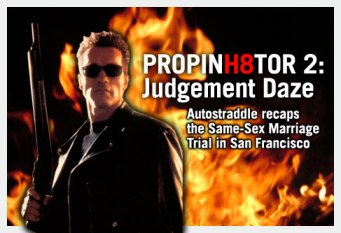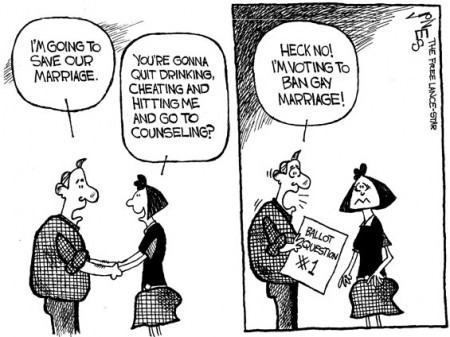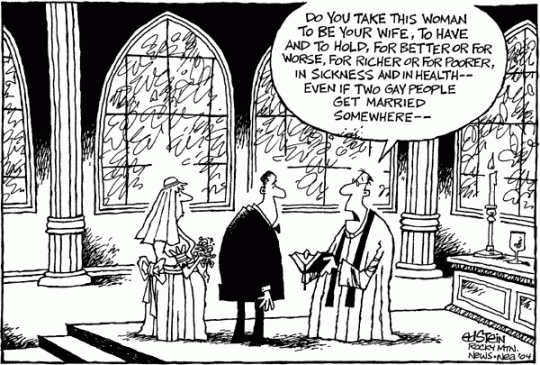![]() Hey, remember Jessica the lawyer from our Prop 8 Q&A on Saturday? She’s back, as promised, to further explain the legal issues behind the gay marriage trial happening in San Francisco this week.
Hey, remember Jessica the lawyer from our Prop 8 Q&A on Saturday? She’s back, as promised, to further explain the legal issues behind the gay marriage trial happening in San Francisco this week.
Because sometimes that shit is confusing.
When we talk about marriage equality, we start with vague ideas of “constitutional protections.” We can’t all delve into legal definitions (that’s my job!) so instead we take these words at face value. If the Equal Protection Clause means anything; it means that gays & lesbians are entitled to the same protections as everyone else, right? Fundamental rights must include the right to dictate the most fundamental aspects of our lives — our families.
And yet, for the past week, we have tracked the arguments in federal court, where witnesses have spent hours discussing discrimination, stigma, economic impact analysis, mental health problems, and a wide range of consequences that essentially stem from the fact that gays and lesbians exist but are somehow exempt from equal protection.
These are undoubtedly important things to consider in some context. But stop and think about it. It seems a little irrelevant, right? If we begin with the assumption that everyone is entitled to equal protections and should be granted fundamental rights, why would it possibly even matter if California might generate additional revenue from legalizing marriage and therefore selling lots of gigantic wedding cakes? Shouldn’t the arguments center on, for example, the fact that my little brother can visit California and marry his girlfriend while I cannot? Ignoring the fact that this hypothetical is all about me and the court case isn’t, wouldn’t this be a more sensible place to begin? After all, if we’re both people entitled to equal protections under the law, why can he do things I can’t? Why is that not enough?
The answer? The legal world is not like the rest of the world.
In a courtroom, making an argument to strike down a law based on the equal protection clause requires more than just demonstrating obviously unequal treatment – it requires demonstrating that the type of unequal treatment is akin to other types of unequal treatment that have already been deemed unconstitutional. Allegations that marriage is a fundamental right because it is fundamentally important to all aspects of a person’s life will go nowhere — instead we must search prior cases that note the fundamental right to marriage.
In essence, this is what has happened in the past week. After emotional pleas from both sides in opening arguments, Team Totally Right‘s attorneys took control of the courtroom. (As the plaintiffs, they present their witnesses and evidence first). According to their trial memorandum, they have two primary goals before they finish presenting next week: they intend to offer evidence to support the assertions that Proposition 8 violates both the Equal Protection Clause (1) and the Due Process Clause of the Fourteenth Amendment (2). If Proposition 8 is found to be unconstitutional on either ground, it will be struck down.
Although these two arguments are related and rely on much of the same evidence, these are two distinct legal issues.
So today we’re gonna just focus on one component of the argument…
The Equal Protection Clause as it relates to sexual orientation.
A phrase like “equal protection under the laws” seems to suggest that the law is supposed to treat us all the same. In reality though, the law often treats different groups of people differently based on particular attributes. For example, consider alcohol. If you’re over 21, you can drink. If you’re under 21, you cannot (legally). In allowing only some people to drink, the government is treating people unequally, but this is permissible. Why?
“The issue isn’t whether the government is classifying people at all, but whether they have a good enough reason to do it.”
Because the issue isn’t whether the government is classifying people at all, but whether they have a good enough reason to do it. Most of the time, if someone alleges that a particular law violates the Equal Protection Clause, the court will evaluate the law using rational basis review.
A reviewing court will ask only whether there is a “rational relationship” between the government’s actions and a “legitimate” governmental purpose. The government has restricted the drinking age to 21. Evidence has linked lower drinking ages to increased traffic crash involvement. The state has a legitimate interest in reducing death and injury from traffic crashes. There is a rational relationship between the drinking age and a legitimate governmental purpose. These laws can stand, despite the fact that people are being treated differently.
This is a very deferential standard; most things pass rational basis review. However, the government really is required to establish that it has a legitimate purpose. And, as the Supreme Court previously noted in Lawrence v. Texas, “a bare … desire to harm a politically unpopular group cannot be a legitimate governmental purpose.” When there is evidence that the intent of a law is to harm an unpopular group, courts must examine the intention a bit more carefully.
 Reasonably, our attorneys argue that Prop 8 was nothing more than an attempt to harm an unpopular group. To do this, they need to first demonstrate an animus toward the gay community — which means we turn to the supporters of Prop 8. They’ve gone to great lengths to make their irrational hatred clear. This doesn’t mean that the court couldn’t find a separate “legitimate” purpose. However, it does provide grounds for the court to provide a more in-depth review.
Reasonably, our attorneys argue that Prop 8 was nothing more than an attempt to harm an unpopular group. To do this, they need to first demonstrate an animus toward the gay community — which means we turn to the supporters of Prop 8. They’ve gone to great lengths to make their irrational hatred clear. This doesn’t mean that the court couldn’t find a separate “legitimate” purpose. However, it does provide grounds for the court to provide a more in-depth review.
Ultimately, few things are struck down as unconstitutional under purely rational basis review. For those of us who want to see Proposition 8 deemed unconstitutional, we’d prefer the court not use this standard of review at all. Instead, we want to persuade the court that these circumstances call for a higher standard of review and that they need to look at the government’s actions a little more carefully. How do we do this? By demonstrating that the government hasn’t just drawn a random classification that affects everyone equally — but that the classification harms a “suspect class.”
The Constitution says nothing of suspect classes, but it is one of the most important concepts in equal protection jurisprudence. Back in 1938, the Supreme Court was contemplating the regulation of fake milk in U.S. v. Carolene Products. In a footnote, the Court noted that, although the judiciary generally has a great deal of deference for the legislature, the Court should look more closely when the regulations discriminate against a group warranting special judicial protections.
Since this time, the Supreme Court has outlined four key criteria that should be considered when deciding whether a group warrants special protections: a court must consider whether the relevant legislation is aimed at “discrete and insular minorities” who lack the “normal protections of the political process.” The court will also examine whether membership in the group is based on immutable characteristics and evaluate the history of discrimination against the group.
The Supreme Court has only identified a few suspect classes that warrant heightened scrutiny. Discrimination based on race, national origin or gender warrants some form of heightened scrutiny. Much of the evidence presented this past week has been geared at demonstrating that sexual orientation should be considered a suspect class, and laws targeting gays and lesbians should be subject to heightened scrutiny.
“Laws in 31 states have made it clear that we lack the normal protections of the political process.”
The idea that gays, lesbians and bisexuals comprise a discrete and insular minority is not really a question, and laws in 31 states have made it clear that we lack the normal protections of the political process. Really, the ultimate arguments regarding whether we should be considered a suspect class are likely to center upon whether being gay or lesbian is an immutable characteristic and the history of discrimination.
Immutable characteristics draw special attention, because it is generally recognized that it is unfair to punish someone for something they didn’t choose and cannot change. When Plaintiff Kristen Perry took the stand, she was asked if she thought her feelings will change regarding men (she promised they wouldn’t). Helen Zia testified to the fact that, though she did not have her first relationship with a woman until 12 years out of college, she’s been a lesbian her entire life. Next week, Ryan Kendall will take the stand to discuss his experiences as a gay man who was forced into conversion therapy in his youth. All of these things are presented as evidence to support the claim that sexual orientation is an immutable characteristic.
Finally, and perhaps most importantly, we must establish that gays and lesbians have faced discrimination. Which seems…obvious? But still, we have to put evidence in the trial record. So Professor George Chauncey took the stand to detail the history of discrimination against gays and lesbians. Dr. Ilan Meyer testified that gays and lesbians expect to face discrimination and discussed the stigmas associated with being not heterosexual.
Given these four factors, it seems nearly impossible to imagine that sexual orientation isn’t a suspect class. Yet, the Supreme Court has not yet decreed as much…and it’s really up to them. Clearly, though, with the evidence presented, we’re laying the groundwork in the hopes of securing a classification.
So what happens if sexual orientation is deemed a suspect class? Proposition 8 will be subject to some form of heightened review — either strict scrutiny or intermediate scrutiny.
Under strict scrutiny (which is currently used to review laws that classify people based on race or national origin), the law can only stand if it is “narrowly tailored to serve a compelling governmental interest.” The government has to prove that it has a truly important reason for discriminating and that they cannot reach this objective through less discriminatory means.
Under intermediate scrutiny (currently used to review laws that classify people based on gender), a law can only stand if it is “substantially related to an important governmental interest.”
Under either standard of heightened review, the court will review the government’s actions much more carefully than it does when using rational basis review. This is good. But this doesn’t end the case. On heightened review, the government still has the opportunity to demonstrate that it has a sufficient reason for the law — and if it can, the law can be upheld.
So, the other thing that our attorneys are trying to do is demonstrate that there is no narrowly-tailored, compelling reason or substantially related important reason (or even legitimate reason) to prevent gays and lesbians from marrying. And this explains all of the testimony regarding things like Dr. Michael Lamb’s testimony on the impact of same-sex parenting on children and Dr. Edmund Egan’s testimony on the economic consequences of marriage equality. We really only get one shot to get all of these things in the trial record — so the attorneys are making sure they’re covering everything that might be relevant.
Confused yet? There’s a reason people have devoted entire careers to understanding constitutional law.
But if you have any questions, I’ll be in the comments!
+
+







Hi!
I was just wondering, if marriage equality were to win this lawsuit in California, what would it mean for the rest of the country? Would it change anything?
I also wanted to say that I’m from Canada, and you could marry your girlfriend or your cousin here, even your gay cousin if you wanted, but the Canadian gays are rooting for you guys in our sweaters and mittens!
I’m probably moving to Canada at some point.
Not that I wanna marry my cousin.
in maine you can marry your cousin, but not your girlfriend.
And they say gay marriage will lead to incest! While in fact incest is more legal than gayness?
I LOVE YOUR COUNTRY, it’s like reality TV only way more sad and real.
loves.it.
yeah, this comment.
scores more than barry white.
I wish people didn’t bring up “they let you marry your cousin!!” as some sort of “look how backwards they are” statement. Marriage between cousins is common in many cultures of the world, notably Arabic and South Asian, and childbirth is about as risky as having a child over the age of 40 (a.k.a. a little bit, but not so much to warrant hue and cry). I’m a child of first cousins and neither I nor my sister have any birth defects to speak of.
If you want to point out how behind-the-times certain areas are, please don’t use cousin marriage as an example. It’s infuriating and racist (“oh look at those backwards uncivilized cultures who let their cousins marry!”).
I don’t have an issue with cousin marriages! Love is love as far as I see it, as long as it’s consensual.
Sorry if my post came off as intolerant, sarcastic, and rude,
I was more or less commenting on the fact that that anti-gay people use incest as some sort of ‘dangerous’ consequence to allowing gays to marry.
Thanks for the enlightenment Tiara.
You’re absolutely right of course and kudos to you for saying it out loud.
On a slightly related note I do think that incest in general has an undeserved stigma. If consenting adults want to fuck, why should it matter that they are related? I’ve heard that it may not be a good idea for close family to have children but that’s entirely beside the point isn’t it?
That depends. (Which, incidentally, is the favorite expression of any lawyer).
Let’s start with the presumption that the Supreme Court agrees to hear the case. If they do, we need five of the nine justices to decide in our favor for Proposition 8 to be struck down. However, each of these Justices can reach this decision in their own way.
So, for example, four Justices could decide Prop 8 is just fine, two could decide that it violates the Equal Protection Clause based on sexual orientation, one could decide that it violates Equal Protection based on gender, and two could decide that it violates the Due Process Clause.
In the end, we’d have five Justices saying Prop 8 was no good, so it would go away. But, we wouldn’t have any kind of broad consensus regarding why. So, when the next law is challenged in another state, the judge wouldn’t have clear, binding precedent to use (and would therefore have more leeway in reaching a decision).
If, instead, five justices say that preventing same-sex couples from getting married is a violation of the Equal Protection Clause — then the next judge to hear a case on marriage equality would have clear guidance.
(Let me know if that doesn’t make sense; I’m afraid I’m not articulating this point very clearly).
If instead, the Supreme Court decides not to review the case, but the Ninth Circuit holds Prop 8 to be unconstitutional, Prop 8 still goes away. But the rationale provided by the court is only “binding precedent” for the courts in the Ninth Circuit (Alaska, Arizona, California, Idaho, Montana, Hawaii, Nevada, Oregon, Washington).
I’m left to wonder why laws involving race are under strict scrutiny while those involving gender are under intermediate scrutiny. I mean of course racial matters deserve strict scrutiny, but I wonder why gender gets any less.
So this whole case is only to try to establish us as a suspect class? And then the scrutiny happens and Prop 8 gets reviews? Phew. Workload.
This really helped a lot, thank you.
The gender/race scrutiny issue was pretty contested, once upon a time. Back in 1973, it appeared that we were heading toward strict scrutiny for gender. In Frontiero v. Richardson, four Justices held that gender discrimination warranted strict scrutiny, while a fifth rule the same way but didn’t use strict scrutiny analysis to get there. Historical rumor has it that the fifth justice was holding out for the Equal Rights Amendment to decree that strict scrutiny was appropriate. But then…it never passed.
It’s been pretty well settled since 1976 and Craig v. Boren. Five Justices decided intermediate scrutiny was the appropriate standard of review, and it’s been used consistently since that point.
The reasons? According to the con law book I just pulled out, supporters of this standard argue that the 14th Amendment was intended to address racial issues, not gender issues. And that biological differences between men and women make it more likely that the classifications are warranted. And that, although women are certainly underrepresented in many contexts, we aren’t technically a minority.
(I’m certainly not professing this to be true, just offering up the arguments of others).
With regard to your second question: the whole trial isn’t just for this. There are actually three distinct arguments, and only one of them turns upon sexual orientation being decreed a suspect class. (I’ll be detailing the remaining two in the next few days).
Let me know if you have any other questions.
this is so great and awesome. i am so terrible at understanding law things and you’ve somehow managed to help me understand.
but i still wish there were less big words and legal terms between myself, a hot babe and a wedding ring.
i actually am not all that into marriage- but fuck letting anyone take rights away because of love. there’s no danger, death, pain, apocalypse or really any good reason to ban gay marriage.
and this is only kind of related, but how do they pick who gets to speak at these things?
You’re allowed to have expert witnesses testify if they have special “knowledge, skill, experience, training, or education” that will help the court understand particular issues. Basically, you choose the most credible person you can find who supports your assertions.
Thank you again, smoking lesbian lawyer! These breakdowns for the hoi polloi are really helpful. Even though I wish law was more like “This is clearly stupid, so I declare it wrong. Prop 8, go suck it”
This is why I could never be a lawyer.
DITTO.
oh, and you just used hoi polloi.
which is my FAVORITE WORD EVER.
after the word columbia (or colombia).
OMG. i just took a course that focused on freedom, equality, and difference that discussed issues such as strict scrutiny etc. and i was so confused, like, some parents were pissed off in seattle and san antonio, no comprende. then i come over to AS and all this is so easily explained by a kickass smoking lesbian lawyer. makes me reconsider that pricey “ivy-of-the-west” education. Autostraddle University, anyone?
Thanks for this. The example with alcohol was very enlightening.
Wish I had a hot con law prof. Instead I got a stodgy old man who called me Oriental and then used threw around the word fag/faggot in class and caused a big hoolabaloo. He had the responsibility of teaching us about equal protection … RIGHT. Truthfully, I didn’t understand con law until I studied it for the bar.
Also, just wanted to point out that I think (I only quickly scanned the court opinion when it initially came out) in In re Marriage, the cal supreme court actually used strict scrutiny and held that gblt folks are a suspect class. I know it has no bearing on the current federal case, but ya know … just wanted to say it’s not out of the realm of possibility for old judge types to decide on Team Totally Right’s side. :)
Awesome explanation Jessica. I’ve just sent this to pretty much everyone I know.
If anyone else also wants to take this explanation and try to understand how it works in practice, the Iowa court case deals with the same principals.
http://www.desmoinesregister.com/assets/pdf/D213209243.PDF
is the complete ruling and
http://www.desmoinesregister.com/assets/pdf/D213209143.PDF
is the summary.
I’d read through these last April, but it’s all much clearer now.
Pingback: Prop 8 Gay Marriage Trial Explained Pt. 2: Equal Protection & Why … | MyGaySpot
Really great stuff Jessica. I kind of like/hate this law stuff but at least I understand what’s happening now.
The legal world sounds crazy complicated! Thanks for explaining it Jessica! I have a question though — how much is this whole trial costing? I feel like it’s a number that would let me go to Columbia four times over.
Honestly, that’s a question I can’t even pretend to answer. Between the two sides, though, it’s undoubtedly an insane amount of money.
“Objection, your Honor. You can’t preface your second point with “first of all.”
Can we get Alan Shore on Team Totally Right PLEASE!
And we definitely need Jessica there to do play-by-play, cause I am lost in legalese without her ‘splain it all ;)
Jessica’s articles are filling my head with unrealistic fantasies of enrolling in law school and being surrounded by hot articulate lesbian lawyers fighting eloquently and hotly for truth and justice.
I was a Computer Science major. If this was true, I would find some way to make that work for law school.
I’m really hoping it’s true!
Wow! This article was incredible! Thanks so much to Jessica and autostraddle for making all of this make so much sense.
I’ve been reading this website for barely a week, and already i am so impressed by everything i see.
Question. In my mind, and probably for pretty much everyone here, it seems so obvious that being g/l will be named a suspect class and that everything will fall into place for at least the 9th circuit. But how likely is it that this won’t happen? Any idea what the other side has up their sleeve?
As obviously right as these arguments may seem, there’s actually a really good chance that sexual orientation will not be decreed a suspect class. The best indication? It hasn’t been yet.
This article only details one part of our argument. We’re also arguing that Prop 8 violates the due process clause in impeding the fundamental right to marry, and that Prop 8 violates the Equal Protection Clause on the basis of gender. So we have several arguments explaining why we win.
For each of these arguments, they have a counterargument for why they win. For example, when discussing equal protection, they argue that sexual orientation only warrants rational basis review (because gays and lesbians have ample political power, sexual orientation isn’t immutable, and the discrimination isn’t as prominent as we allege it to be). But, even if sexual orientation warrants heightened scrutiny, they still claim to win, because they allege lots of “legitimate governmental interests” in limiting the definition of marriage.
So…it really could go either way. If you keep following the trial, you’ll hear more of their arguments soon.
I have a question about the timing, if that’s OK. How long after the trial is decided at this level will it take effect? Will it at all, if there’s an appeal? And, of course, the same for the Appeals and Supreme Courts.
Good question.
Trial orders are generally effective immediately. The fact that the case is appealed or is likely to be appealed doesn’t inherently change this.
The defendants could request an injunction, or temporary hold, by attempting to demonstrate that if the Prop 8 was immediately repealed they would suffer irreparable harm and therefore the repeal should be held until the appeal is complete. But I don’t imagine they’d have much success with that argument. Given that the whole trial largely centers around the fact that allowing same-sex couples to marry won’t hurt anyone (so demonstrating irreparable harm would be tough).
I think our attorneys are planning to be arguing at the Supreme Court within two years (presuming that the Supreme Court accepts the case).
Does that answer your question?
I believe so. Thanks.
So: a win right now means marriages most likely would resume immediately, then potentially be put on hold again by the appeals court? Wonderful. A marriage trampoline!
We should note the relevant precedent in this case.
The Fourteenth Amendment was insufficient to overturn laws denying suffrage on the basis of gender (Minor v. Happersett).
The Fourteenth Amendment was insufficient to overturn laws allowing gender-based draft exemptions (Rostker v. Goldberg)
The Fourteenth Amendment was insufficient to overturn statutory rape laws that applied only to men (Michael M. v. Superior Court)
I guess that’s why we’re shooting for strict scrutiny for the LGBT population.
While not irrelevant precedents by any means, it’s also important to note that gender and sexual orientation are two different, if related, things. Jessica noted that sexual orientation hasn’t been deemed a suspect class yet either, but it dose raise an entirely different history of discrimination (as Team Totally Right has been showing).
Correct. Gender has been deemed a suspect class though, and we’re also arguing that Prop 8 is unconstitutional based on gender discrimination. (More on that in a future article).
I should know better than to feed the trolls. Especially trolls that stop by with out-of-context assertions in lieu of well-reasoned arguments.
But lest anyone become concerned: controlling precedent for gender discrimination comes to us from Craig v. Boren in 1976, not the 1874 case of Minor v. Happersett. (Technically the case hasn’t been overturned, but using it to argue the appropriate levels of review for gender discrimination laws would get one laughed out of court).
According to Craig v. Boren, laws that discriminate on the basis of gender must be reviewed using “intermediate scrutiny.” The classification must be “substantially related to the achievement of an important governmental interest” or the law cannot stand. As I explained above, the issue is not whether the government is classifying people — but whether they have a good enough reason to do it.
In Roster v. Goldberg, the court held that requiring only men to register for the selective service was “substantially related to an important governmental interest.” That interest? Having soldiers ready for combat. Women still, technically, are not allowed in combat zones — and therefore the government wouldn’t have a reason to draft them. Accordingly, the court let the classification stand.
And Michael v. Superior Court? In 1979, the California Supreme Court (which, incidentally, does not offer binding precedent on federal issues for any federal court) ruled that under the California Constitution, strict scrutiny was the relevant standard. The court upheld the law on the grounds that it was justified by an important state interest. (Presumably because the law had passed strict scrutiny, the court didn’t bother addressing the federal intermediate scrutiny requirement).
Heightened scrutiny doesn’t mean either side wins. It just means the court will review the classification more carefully than it would if the classification only warranted rational basis.
I have no doubts that the court will consider relevant precedent. These particular cases, though, are wholly irrelevant to the current question before the court. For the record, the attorneys for the Prop 8 proponents don’t even bother referencing any of these cases in their Trial Brief.
Jessica,
Michael M. v. Superior Court was a UNITED STATES Supreme Court decision.
I have another question.
If Judge Walker agrees with Team Totally Right, will CA begin issuing marriage license again or would it be put on hold while the case remains in appeals?
When will part 3 be up?
Friday or Saturday!
Thanks, and looking forward to it!
Hi – why not argue Prop8 is a classification based on *gender*, as opposed to sexual orientation? I believe the amendment defines marriage in terms of the sexes, not sexual orientation, which means marriage is allowed or disallowed based on the standard of gender. And gender already gets heightened scrutiny, so you wouldn’t have to argue for raising the level of scrutiny, like you would on sexual orientation grounds.
Oh, they’ll have lots and lots of arguments, and use them all as strategically appropriate. I’m afraid I couldn’t fit everything into one article of reasonable length, so that argument ended up in the next part:
http://www.autostraddle.com/prop-8-gay-marriage-trial-explained-pt-3-29913/